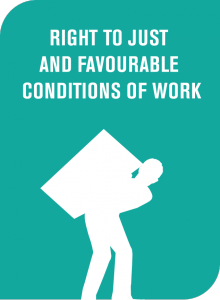
What it means
- African Charter on Human and Peoples Rights (Article 15): Every individual shall have the right to work under equitable and satisfactory conditions, and shall receive equal pay for equal work.
- American Convention on Human Rights (Article 6.1 and 6.2): No one shall be subject to slavery or to involuntary servitude, which are prohibited in all their forms, as are the slave trade and traffic in women. No one shall be required to perform forced or compulsory labor. This provision shall not be interpreted to mean that, in those countries in which the penalty established for certain crimes is deprivation of liberty at forced labor, the carrying out of such a sentence imposed by a competent court is prohibited. Forced labor shall not adversely affect the dignity or the physical or intellectual capacity of the prisoner.
- European Convention on Human Rights and Fundamental Freedoms (Article 4.1 and 4.2): No one shall be held in slavery or servitude. No one shall be required to perform forced or compulsory labour.
- ASEAN Human Rights Declaration: Every person has the right to work, to the free choice of employment, to enjoy just, decent and favourable conditions of work and to have access to assistance schemes for the unemployed.
- Arab Charter on Human Rights (Article 34.2): Every worker has the right to the enjoyment of just and favourable conditions of work which ensure appropriate remuneration to meet his essential needs and those of his family and regulate working hours, rest and holidays with pay, as well as the rules for the preservation of occupational health and safety and the protection of women, children and disabled persons in the place of work.
(See also General Comment No. 23, Committee on Economic, Social and Cultural Rights)
How it relates to violence against women
The ‘feminisation of poverty’ is a term used since the 1970s to describe the different social, cultural, political and economic patterns around the world that have kept women disproportionately poor. As a result of unresolved gender inequality that often places women in the private, ‘home’ sphere, many women who do work are often forced into informal and/or unstable employment. For example, the majority of domestic workers are women – many of whom belong to minority groups or are migrants. Very often these women are isolated and ‘subject to slave-like conditions’ among other forms of abuse (ICESCR General Comment No. 23) and are offered no formal protections from the state.
In areas where women are able to find formal employment, they also face an increased risk of violence against women. In February 2016, the United States Bureau of Justice Statistics reported that more than 43,000 workplace rapes and sexual assault occur each year. Other forms of violence can occur when an employer threatens to fire a woman for refusing to have sex with him. In these situations women are subject to physical, sexual and economic abuse, as employers use income as a way of disempowering women and controlling their behaviour.
Examples of violence against women that violate this right include:
- Economic abuse by employers
- Sexual harassment in the workplace
- Forced labour
Click on the cases to the right (or, for mobile users, at the bottom of this page) to learn more about the right to just and favourable conditions of work and violence against women.
Icon Key




